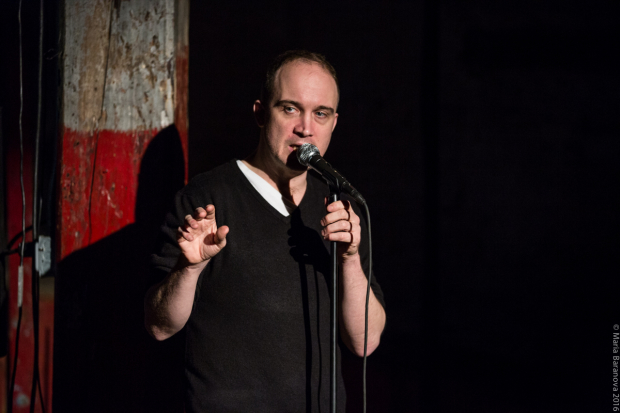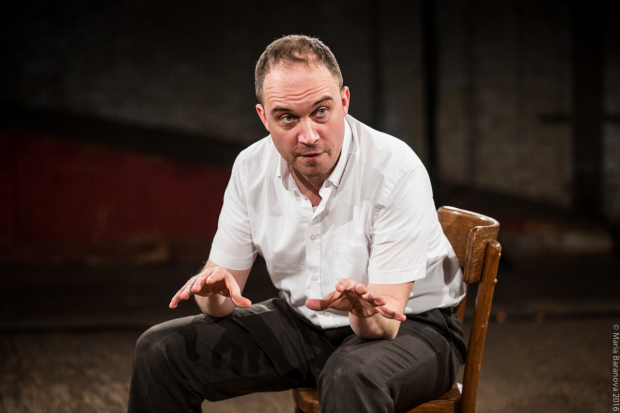Confirmation

(© Maria Baranova)
Fans of challenging, probing theater will not want to miss U.K.-based writer and performer Chris Thorpe's gutsy new solo play, Confirmation, now playing at the Invisible Dog Art Center as part of P.S. 122's COIL Festival. Those who prefer to keep their preciously held beliefs intact might want to stay away. Unfortunately, according to this show, that latter group constitutes the vast majority of human beings.
Confirmation is Thorpe's exploration of confirmation bias — that's the impulse to look for information that confirms our preconceived notions while casually disregarding (or even attacking) any contradictory evidence. Thorpe (and evolutionary psychology) contends that this behavior is hardwired, the product of eons of human evolution meant to reinforce tribal solidarity by fortifying shared beliefs. That instinct exists even for modern, allegedly rational people. As director Rachel Chavkin writes in her program note, "The conscious level of our thinking exists largely to justify or rationalize what the subconscious decided many, many nanoseconds ago."
Admittedly, the title of the show is somewhat misleading: While Thorpe does re-create Peter Watson's famous psychological experiment about confirmation bias, much of the play revolves around exploring the views of Glen, a "proud national socialist" (or Nazi) that Thorpe contacted to see if he could have an honest tête–à–tête with someone whose views are completely the opposite of his — if he could beat his confirmation bias. Along the way we get into extended examinations of globalization, economic malaise, Anders Behring Breivik, and yes, the Holocaust.
Chavkin (who developed the piece with Thorpe) is known for the incredibly intelligent and well-researched body of work she has produced with the TEAM. Plays like RoosevElvis, Mission Drift, and the vastly underrated Architecting are the theatrical equivalents of taking a caffeinated journey down a Wikipedia hole. Confirmation has that same level of intellectual curiosity, accented by Thorpe's own pseudo-poetic style, which often devolves into an internal monologue. While somewhat discursive, it is never boring.
Part of that has to do with the performer: With his distinctly Mancunian dialect and mischievous smile, Thorpe brings an affable, conversational feel to the piece as well as a willingness to go off-script (he is the author, after all). At the same time, there's something menacing about his physicality: He lifts a chair with a sudden jerk and one reflexively recoils, bracing for attack. It's an unsettling synthesis, causing us to mistrust our initial impressions of everything.
Adding to the tension is the fact that we really cannot look away: Performed in the round, Confirmation forces us to see the reactions of our fellow audience members. Even when we wince at Glen's crackpot theories about "race traitors" and the international cabal of Jews purposely destabilizing society, we can't help but see other people across the floor doing the same…or not. Thorpe gets in the faces of the spectators in the front row, gazing sincerely into their eyes as he recites Glen's answers to questions about how he came to his beliefs. It's very uncomfortable.

(© Maria Baranova)
Even more challenging is Thorpe's portrait of Glen. Despite his highly dubious claims about social and political issues, he doesn't come off as a monster. He's certainly not "mentally ill," a term with which we have become too accustomed to dismissing those holding extreme views. Rather, he's a mild-mannered guy who lives in a modest bungalow, works hard to save his local fire station, only buys local, and believes that the Holocaust was a hoax. He's Glen, the friendly neo-Nazi. Of course, that doesn't make his ideas any less repugnant, which leads Thorpe to question the usefulness of trying to find any common ground with him.
Thorpe's eventual physical revulsion at Glen's white supremacy is understandable, but no less disappointing for what it bodes about Thorpe's experiment. When he lashes out, the ferocity he has kept veiled nearly breaks free of its polite liberal chains. We cannot help but entertain the thought that perhaps Glen is right about one thing: We prefer to be around people just like us. It's a conclusion certain to disturb anyone who cherishes the virtues of a pluralistic society.
Near the end, Thorpe tantalizes us with a political blind item: Glen (obviously not his real name) has recently entered politics under the auspices of an established British party, "and not, maybe, the one you're thinking," he teases. The conclusion you draw from that deliciously vague statement is likely to say a lot about your own bias: You probably don't imagine him standing for office under a party for which you might actually vote.











